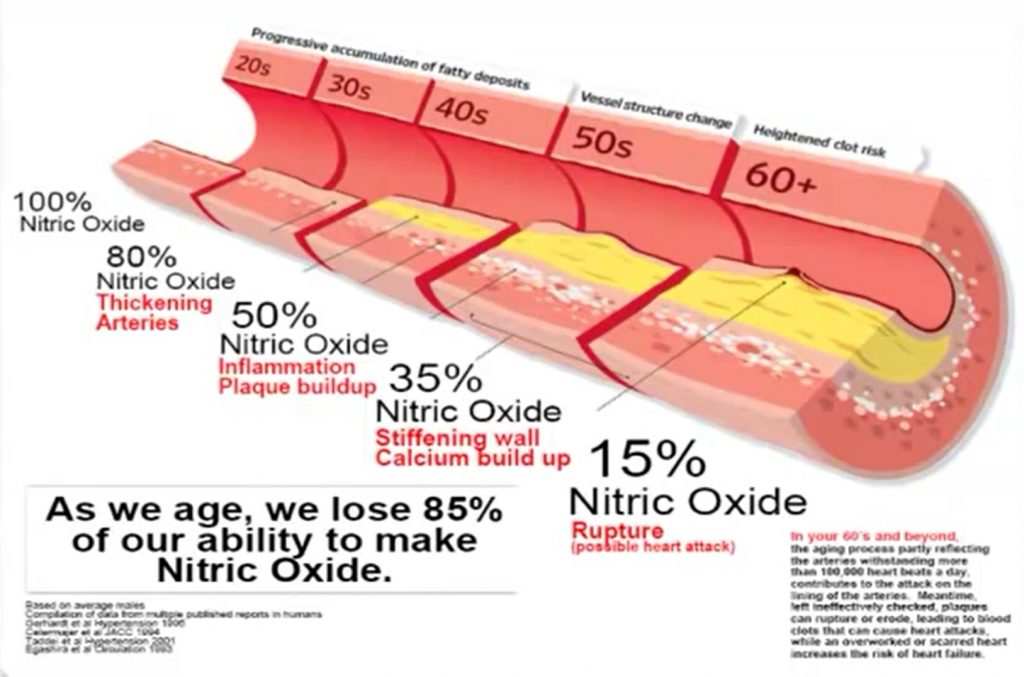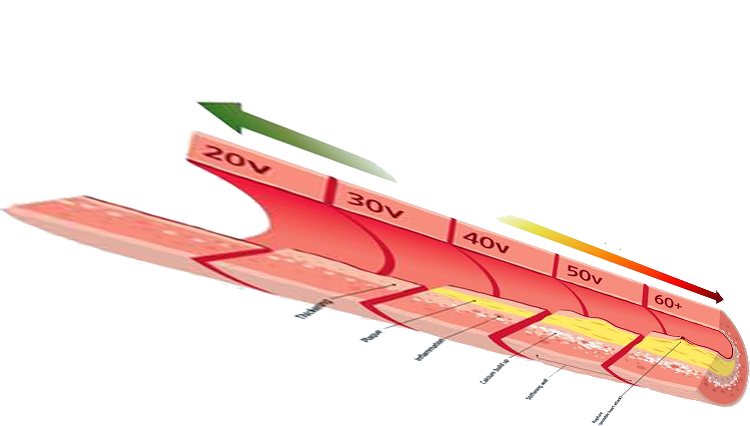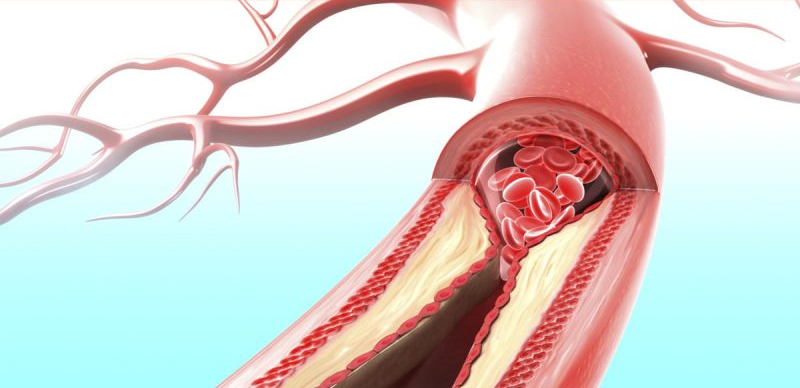This little powerhouse-nutrient plays a number of other important roles in your health, with benefits stretching far beyond your heart and blood. It appears that cardiovascular benefits may have just been the tip of the iceberg when it comes to what L-arginine can do for you—including possibly slowing down the aging process itself.
Read more: Dr Mercola’s article opens [ here ] reposted here:
We have known for 20 years that the amino acid L-arginine offers multiple vascular benefits to people with heart disease, or those who have increased risk for heart disease due to multiple cardiac risk factors. L-arginine is a key nutrient in promoting efficient blood flow and overall cardiovascular function. L-arginine is considered one of the “semi-essential” amino acids—meaning, your body can’t produce it in sufficient quantities, so you must obtain most of it from your diet.
But new research is emerging every day that this little powerhouse-nutrient plays a number of other important roles in your health, with benefits stretching far beyond your heart and blood. It appears that cardiovascular benefits may have just been the tip of the iceberg when it comes to what L-arginine can do for you—including possibly slowing down the aging process itself.
My aim of this article is to present the scope of the bulk of the research to date.
This is no small endeavor, because at least 800 scientific studies have been published on this one amino acid, which has been studied with respect to its role in more than 150 diseases. Before I get into some of the other health areas, let’s first review what L-arginine is and why it’s so important for your cardiovascular health.
Meet 1992 “Molecule of the Year”: Nitric Oxide
What do L-arginine, car exhaust, dynamite and fireflies have in common? The answer is nitric oxide, simply abbreviated “NO”: one nitrogen atom attached to one oxygen atom. Nitric oxide is a soluble, highly reactive gas produced in certain animal and plant cells from the amino acid L-arginine, and is a byproduct of combustion, as well as a product of natural chemical reactions in our atmosphere. Nitric oxide can be derived from nitroglycerin as well, which is a major component of dynamite.
Nitric oxide also plays a role in firefly (lightening bugs) flashing! It is a very prevalent molecule in the environment, but it has only been in the last 20 years that scientists have discovered just how important it is to your health.
The many roles of nitric oxide—biological and otherwise—are so impressive that it was dubbed “Molecule of the Year” by Science magazine in 1992, followed by the 1998 Nobel Prize in Medicine for its discovery as a signaling molecule in the cardiovascular system. Please don’t confuse nitric oxide (NO) with nitrous oxide (N2O), or “laughing gas,” the anesthetic gas used by dentists, which is two nitrogen atoms attached to one oxygen.
Getting back to L-arginine, most of the health benefits of L-arginine are related to the fact that it is a precursor to nitric oxide in your body. L-arginine is the only known nutritional substrate in your blood vessel lining available to endothelial cells (cells lining the interior surface of your blood vessels) for nitric oxide production. Your blood vessels require L-arginine to synthesize NO.
Why is Nitric Oxide So Important?
Nitric oxide has been shown to enhance blood flow and help you maintain optimal blood pressure. Nitric oxide signals the smooth muscle cells in your blood vessels to relax, so that your vessels dilate and your blood flows more freely. This helps your arteries stay free of plaque. When you have inadequate nitric oxide, your risk for coronary artery disease increases.
It also operates as a signaling molecule in your brain and immune system.
If your blood is flowing freely, then nearly every physiological process will function better. If your blood is sluggish, then important cells and nutrients can’t reach the areas that need them. It’s like getting the tow truck to the scene of the accident… no tow truck means no repairs.
Important Roles L-Arginine Plays in Your Body
In addition to improving blood flow and vessel elasticity, L-arginine plays other important biological roles.
For example, it:
- Helps your body get rid of ammonia, a toxic waste product. Your cells release nitrogen all the time from the normal process of repairing and replacing damaged cells, and this nitrogen combines with hydrogen to form ammonia.
- Assists your body in producing other important amino acids: creatine, L-proline, and L-glutamate. Creatine is important to muscle energy and proper nervous system function. L-proline is important for collagen synthesis and the healing of wounds. L-glutamate is an excitatory neurotransmitter, key to brain function—especially left hemisphere functions (logic and reasoning, language, computational skills, learning and memory).
- Promotes good sexual function for both men AND women. Increased microcirculation in genital tissues results in stronger erections and better sexual responsiveness, by the same nitric oxide mechanism.
- Has endocrine effects, promoting the release of two important hormones—human growth hormone (HGH) and prolactin.
Could L-arginine Stave Off Cardiovascular Disease?
Now let’s take a look at what the research says about how L-arginine may benefit your health and prevent, or even help reverse, a number of common diseases. If you include all age groups, heart disease is the leading killer of Americans. An estimated 785,000 Americans suffered heart attacks in 2009 and one person dies from a coronary event every minute, according to U.S. Centers for Disease Control and Prevention (CDC) statistics. Studies show that L-arginine helps your endothelial cells create enough nitric oxide to promote optimal blood flow and cardiovascular health. Anything that may help prevent a coronary artery event deserves thorough investigation.
Unfortunately, nitric oxide signaling declines as a normal part of aging.
If you are a healthy adult, your body will produce about 2 to 4 grams of L-arginine per day. Your body’s need for this amino acid will vary, depending on your overall health and a variety of factors, including your diet, which I’ll discuss later. Your body’s ability to produce L-arginine declines, even as early as in your 30s. By the time you reach your 50s, if you’re a typical adult, you’re already somewhat deficient and diet becomes even more important. Women tend to maintain their ability to make this important amino acid longer than men.
The scientific research is rife with studies supporting the benefits of L-arginine for your cardiovascular health, from just about every angle, as the following table shows.
Helping blood vessels relax, promoting optimal blood flow and epithelial function Hypercholesterolemia Maintaining optimal blood pressure Better recovery after coronary bypass surgery Reducing coronary artery disease risk Preventing atherosclerosis Treatment of heart failure Myocardial ischemia Better recovery after MI Better recovery after heart transplant Pulmonary hypertension/hypoxia Reducing cardiac risk of oral contraceptives
NEWS FLASH: L-Arginine for Better Sex
Many men with cardiovascular disease also suffer from erectile dysfunction, which only contributes to their stress and diminished quality of life. In fact, 75 percent of men with heart disease have erectile problems. It is understandable, when you think about it in terms of one major underlying factor—impaired circulation. If the blood vessels to your heart are damaged, your heart doesn’t get adequate blood. If the blood vessels in your penis are affected, an erection can’t be maintained.
It makes sense, then, that nitric oxide levels are a major factor in sexual function, and the research has borne this out.
In fact, this is how a leading ED drug treats erectile problems—it increases nitric oxide production, relaxing your blood vessels, which increases penile blood flow. However, the price you might pay for these ED drugs is a slew of potentially dangerous side effects—including heart disease, stroke and sterility—conditions that clearly will not lead you toward a long, healthy, passionate life. L-arginine increases the action of nitric oxide—similar to ED drugs, but WITHOUT the potentially dangerous side effects.
Scientific studies have shown that L-arginine can be particularly effective when used in combination with two other natural agents:
- L-arginine and pycnogenol resulted in significant improvement in sexual function in men with ED, according to this 2003 study.
- L-arginine and yohimbine were found to increase sexual arousal in a 2002 study of postmenopausal women with sexual arousal disorder.
In terms of dosage, a pilot study published in the journal European Urology found 6 grams of L-arginine combined with 6 mg of yohimbine was successful in treating men with ED. For a comprehensive list of studies about L-arginine and erectile dysfunction, you can go to this GreenMedInfo page. Nitric oxide is also believed to play a role in women’s sexual function. Estrogen contributes to the control of genital blood flow during female sexual response (Musicki et al, 2009). Declining estrogen appears to play a role in regulating vaginal NO signaling in vaginal tissues, although the mechanisms are still poorly understood. L-arginine has been shown to be essential to sexual maturation in female rats.
Other Benefits… From A to Z
Because good circulation is so critical for every tissue and organ in your body, it isn’t surprising that research is revealing a wide range of other health benefits related to L-arginine. There are simply too many scientific studies to list here. The following table highlights some of them, but for a more comprehensive list, visit GreenMedInfo’s L-arginine page.
Peripheral vascular disease (PVD)/Intermittent claudication Digestion: NO improves trafficking of nutrients and may increase your ability to produce stomach acid (see video linked at top) Slowing Aging: Combined with calorie restriction, L-arginine doubled the lifespan of rats (see video linked at top) Brain health: Increases in L-glutamate improve memory and learning capacity; Increases in creatine and L-proline are important for CNS function; reduced symptoms of Alzheimer’s and ALS Asthma and respiratory health Skin and hair: L-proline helps synthesize collagen, which helps to create healthy hair and skin, reducing the appearance of wrinkles. Also speeds wound healing. Immune support Kidney support Interstitial cystitis: decreased pain and urgency Liver support Nerve regeneration Better exercise tolerance Reduced risk for insulin resistance, type 2 diabetes, and obesity Reduced stress and anxiety, lower cortisol levels Preventing bone loss Decreases symptoms of congestive heart failure Cystic Fibrosis Protects brain during heat stroke Cachexia Potential for role in treating cancer Gastric ulcers
Could YOU Have L-Arginine Deficiency?
As I stated earlier, having adequate L-arginine depends on a number of factors, from age and overall health, to diet. Other factors that could lead to L-arginine deficiency include:
- Not consuming enough protein, or not adequately digesting it
- Needing higher amounts of L-arginine due to your particular genetics
- Having lower antioxidant levels and higher free radical levels
Since nitric oxide is a gas, you can’t just pop a pill to increase your NO level. You are very dependent on your body’s SYNTHESIS of this gas from the raw materials you take in through diet. Making sure you get enough high quality protein and a diet rich in whole foods that are loaded with antioxidants can help. If you suspect you may be deficient in L-arginine, you might consider the added protection of a supplement but it is my STRONG recommendation to first seek it through dietary sources as that is the best way to get it.
Specifically, the foods highest in L-arginine are:
What You Need to Know Before Choosing an L-Arginine Supplement
The greatest challenge for any dietary supplement is making it available in your body at the right time, in the right place and in the right amount. This is particularly challenging for L-arginine, because what you need is the nitric oxide it produces, and nitric oxide is a gas—so is very short-lived.
Therefore, you need a constant source of L-arginine replenishment. Your body absorbs and metabolizes L-arginine very rapidly, meaning you would have to take it frequently during the day to sustain beneficial levels. Therefore, what you need is a sustained release formula (time release) that controls the rate of absorption by your body. I recommend 1,000 mg (1 gram) per day of a sustained release formula.
Just like other supplemental nutrients in the marketplace today, L-arginine formulas vary widely. Make sure that, if you buy an L-arginine supplement, it contains only natural sources and has no artificial fillers or additives like magnesium stearate or stearic acid. It is also important to note that L-arginine does have one minor side effect. It is not recommended if you are suffering from any active herpes infection. This would include herpes simplex, as in oral or genital herpes, or herpes zoster, as in shingles. If you have this type of infection, you should supplement with lysine (a different amino acid) until the lesions are resolved and avoid L-arginine supplements during the infectious phase.
If you have any serious diseases such as diabetes or coronary artery disease, make sure that you discuss any potential supplements, including L-arginine, with your health care provider to minimize your risk of an adverse reaction, or an adverse interaction with any prescription drugs you may be taking.
More Tips for Maintaining a Healthy Heart
As great as L-arginine is, it’s not the ONLY factor determining your cardiovascular risk. You have to pay attention to other diet and lifestyle factors:
- Reduce fructose, grains and sugars in your diet. It is especially important to severely limit or eliminate dangerous sugars such as fructose, which is found in soda and most processed foods. If your HDL/Cholesterol ratio needs improvement, it would also serve you well to also limit fructose from fruits to a maximum of 15 grams a day. Once your cholesterol improves you can gradually reintroduce fruits in moderation.
- Consume a good portion of your food raw.
- Make sure you are getting plenty of high quality, animal-based omega 3 fats, such as krill oil. Research suggests that as little as 500 mg of krill per day may lower your total cholesterol and triglycerides and will likely increase your HDL.
- Follow a nutritional plan. Examples of truly heart-healthy foods and fats include olive oil, coconut and coconut oil, organic raw dairy products and eggs, avocados, raw nuts and seeds, and organic grass-fed meats as appropriate for your nutritional type.
- Drink plenty of fresh, pure water every day.
- Make sure your vitamin D level is high enough. Vitamin D has recently been found to protect against arterial stiffness and impaired blood vessel relaxation—and nearly everyone is vitamin D deficient. Optimally, your level should be between 50-70 ng/ml, however, to treat heart disease, 70-100 ng/ml is recommended. The only way to know if it is at these levels is to test it. My favorite company to test it is Lab Corp.
- Exercise daily. Make sure you incorporate Peak Fitness exercises, which also optimize your human growth hormone (HGH) production. Exercise also improves your circulation, your mood, and just about everything else.
- Be sure to get plenty of high-quality, restorative sleep.
- Avoid smoking or drinking alcohol excessively.
Additional References:
An alt. is Synergy’s ProArgi-9+
(however ProArgi9+ has K2 vitamin so it’s not for people on medicines for heart and cardiovascular disease)

Actually the picture should be more like this, since it’s common that there is retraction of the arteries:

